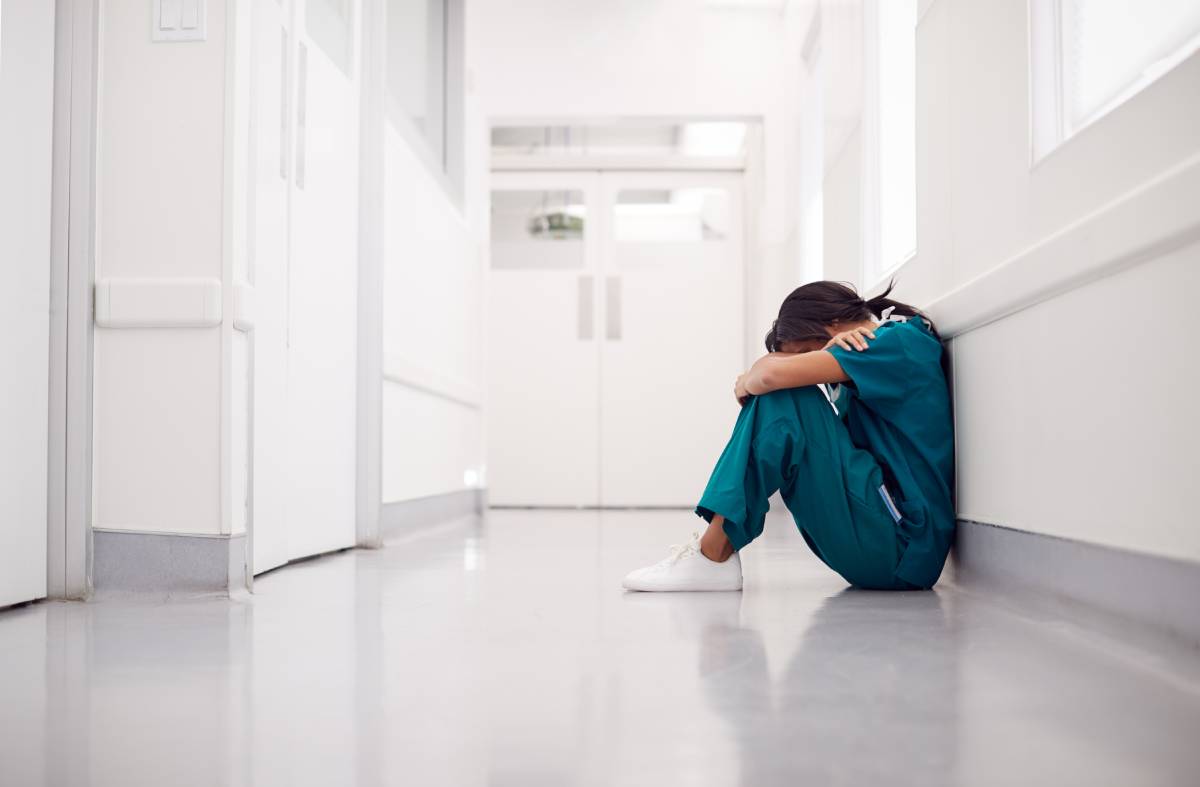Mental Health Resources for Healthcare Workers

Millions of healthcare professionals (HCPs) are at risk for negative mental health outcomes as they work during the COVID-19 pandemic, under distressing conditions.1 A review of physician mental health, published in the Journal of Internal Medicine prior to the onset of COVID-19, found that reported rates of burnout symptoms exceeded 50% in practicing and in-training physicians.2,3 These rates only stand to increase as physicians are exposed to greater physical, emotional, and psychological strain. Although there has been limited opportunity to quantitatively measure the effect that the pandemic has had on HCPs in the United States, preliminary statistics from China and Italy have suggested that levels of depression, anxiety, and insomnia are significantly elevated.4,5 Further, data obtained after the original SARS pandemic determined that, in the short and long-term, essential frontline HCPs are at higher risk of developing anxiety, depressive, or post-traumatic stress disorders.6,7
In order to better understand which measures, policies, and resources must be deployed in order to combat the development of mental illness in HCPs, it is necessary to identify the key contributors to stress and negative mental health outcomes. Research on the current conditions produced by COVID-19 and previous epidemics such as SARS and H1N1 have determined that there are several mental and emotional stressors that are disproportionately responsible for acute stress reactions and adverse long-term mental health outcomes.1,8 These stressors include longer hours, increased risk of exposure to the virus and subsequent social isolation, concern about infecting one’s family, and moral injury from being required to make ethically fraught decisions regarding the distribution of time and resources as hospitals fill to capacity.1,8,9,10,11
In order to mitigate the negative effects of the current situation, healthcare systems must implement efficient and effective evidence-based strategies to maximize already over-stretched resources.1 Adequate PPE is the first and most powerful step that any healthcare organization can take as a preventative measure against negative mental health outcomes in their HCPs. This basic measure is also linked to nearly all of the previously mentioned risk factors for distress.6,8,12
Secondly, although mental health resources have traditionally been allocated to supporting HCPs who have already developed a mental health pathology, this focus needs to be broadened. It is crucial that HCPs are educated about available evidence-based self-help programs, such as those developed by the WHO, as well as proactive coping methods and ways to monitor their personal stress reaction.8,10,13 Monitoring and early intervention reduce the strain on HCPs as well as healthcare systems, especially with the current difficulty of conducting face-to-face psychotherapy.1
Thirdly, although there are limitations on the administration of individualized psychosocial services, these services are nevertheless essential in the treatment of HCPs who are experiencing distress. Further, it is essential that team leaders and administrators receive instruction on how to identify and intervene when colleagues are experiencing high-risk symptoms such as social withdrawal, anhedonia, depression, anxiety, or insomnia.10 HCPs experiencing these symptoms should be referred to qualified mental health professionals; fortunately, mental health services are increasingly being made available by telemedicine, in addition to socially distanced in-person settings.3,8
Finally, it is also necessary to plan for long-term mental health interventions.9 Studies conducted after the SARS epidemic demonstrated that emotional distress among HCPs who treated SARS, was frequently long-lasting, with levels of stress, burnout, and substance use remaining elevated among HCPs for up to two years after the epidemic.9,14 Thus, while action to protect the psychological and emotional health of HCPs must begin immediately, the healthcare system must also make long-term provisions in order to protect provider mental health.
References
- Yang L, Yin J, Wang D, Rahman A, Li X. Urgent need to develop evidence-based self-help interventions for mental health of healthcare workers in COVID-19 pandemic [published online ahead of print, 2020 Apr 28]. Psychol Med. 2020;1-2. doi:10.1017/S0033291720001385.
- West CP, Dyrbye LN, Shanafelt TD. Physician burnout: contributors, consequences and solutions. J Intern Med. 2018 Jun;283(6):516-529. doi:10.1111/joim.12752.
- Santarone K, McKenney M, Elkbuli A. Preserving mental health and resilience in frontline healthcare workers during COVID-19. Am J Emerg Med. 2020;38(7):1530-1531. doi:10.1016/j.ajem.2020.04.030.
- Rossi R, Socci V, Pacitti F, Di Lorenzo G, Di Marco A, Siracusano A, et al. Mental health outcomes among front and second line health workers associated with the COVID-19 pandemic in Italy. JAMA Netw Open. 2020;3(5):e2010185. doi:10.1001/jamanetworkopen.2020.10185.
- Lai J, Ma S, Wang Y, et al. Factors Associated With Mental Health Outcomes Among Health Care Workers Exposed to Coronavirus Disease 2019. JAMA Netw Open. 2020;3:e203976.32202646. doi:10.1001/jamanetworkopen.2020.3976.
- Gold JA. Covid-19: adverse mental health outcomes for healthcare workers. BMJ. 2020 May 5;369:m1815. doi:10.1136/bmj.m1815.
- Brooks SK, Webster RK, Smith LE, et al. The psychological impact of quarantine and how to reduce it: rapid review of the evidence. Lancet. 2020;395:912-20. doi:10.1016/S0140-6736(20)30460-8 32112714.
- Pfefferbaum B, North CS. Mental health and the Covid-19 pandemic. N Engl J Med. 2020. doi:10.1056/nejmp2008017.
- Pearman A, Hughes ML, Smith EL, Neupert SD. Mental Health Challenges of United States Healthcare Professionals During COVID-19. Front Psychol. 2020 Aug 13;11:2065. doi:10.3389/fpsyg.2020.02065.
- Walton M, Murray E, Christian MD. Mental health care for medical staff and affiliated healthcare workers during the COVID-19 pandemic. Eur Heart J Acute Cardiovasc Care. 2020 Apr;9(3):241-247. doi:10.1177/2048872620922795.
- Greenberg N, Docherty M, Gnanapragasam S, Wessely S. Managing mental health challenges faced by healthcare workers during Covid-19 pandemic. BMJ. 2020 Mar 26;368:m1211. doi:10.1136/bmj.m1211.
- Jun J, Tucker S, Melnyk BM. Clinician Mental Health and Well-Being During Global Healthcare Crises: Evidence Learned From Prior Epidemics for COVID-19 Pandemic. Worldviews Evid Based Nurs. 2020 Jun;17(3):182-184. doi:10.1111/wvn.12439.
- Epping-Jordan JE, Harris R, Brown FL, Carswell K, Foley C, García-Moreno C, Kogan C, van Ommeren M. Self-Help Plus (SH+): a new WHO stress management package. World Psychiatry. 2016 Oct;15(3):295-296 doi:10.1002/wps.20355.
- Maunder RG, Lancee WJ, Balderson KE, et al. Long-term psychological and occupational effects of providing hospital healthcare during SARS outbreak. Emerg Infect Dis. 2006;12(12):1924-1932. doi:10.3201/eid1212.060584.
